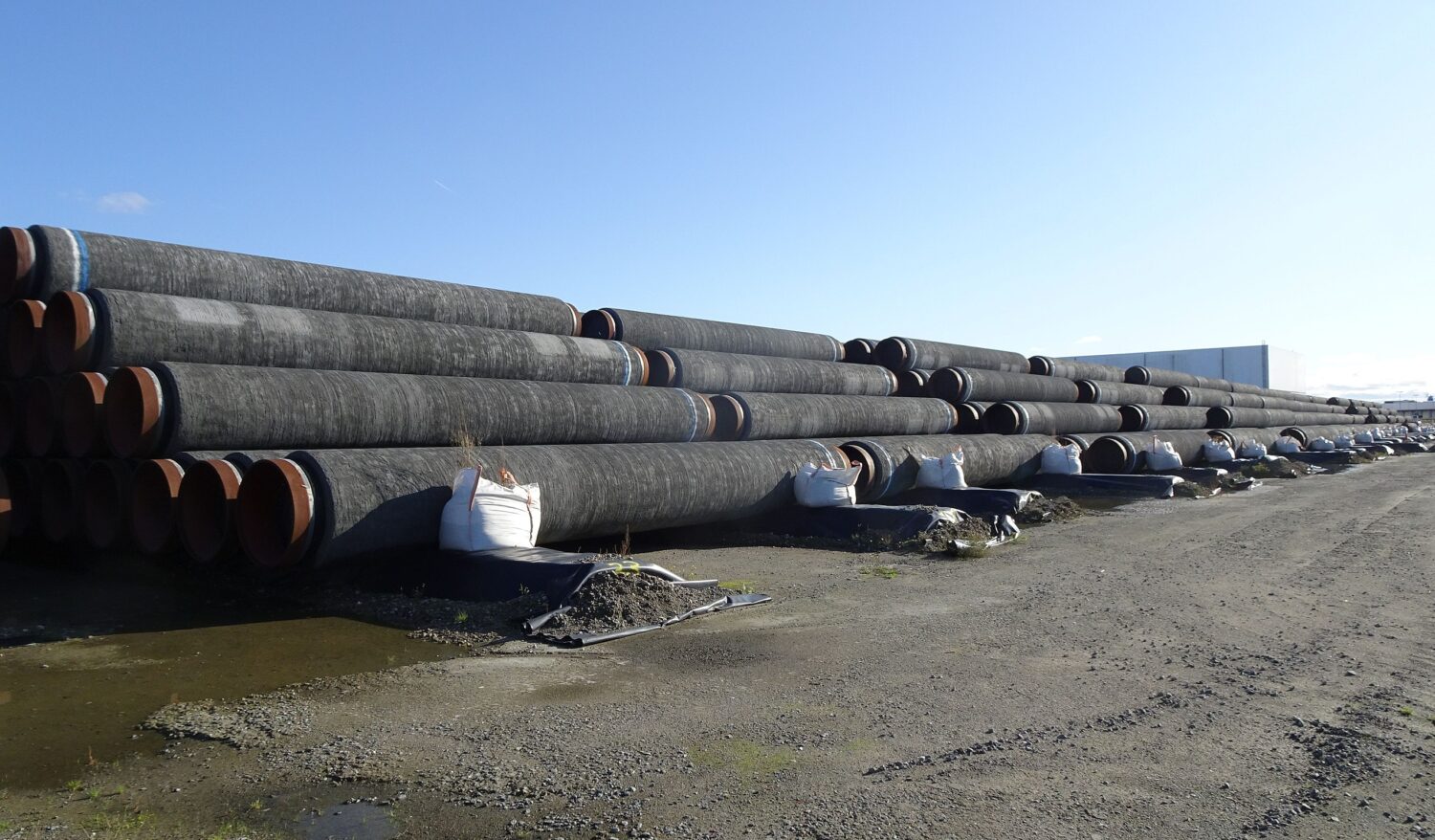On February 8, 2023, a renowned journalist published an article which, referencing a secret source, explains how the Nord Stream pipelines were blown up on orders from the US government. Whoever carried this out, such industrial sabotage constitutes a criminal act directed against Europe. While the war has been raging for a year now, the issues surrounding the gas pipelines give us an opportunity to reflect once again on what is at stake in this terrible conflict.
The account of the American investigative journalist and Pulitzer Prize winning author Seymour Hersh about the sabotage of the Nord Stream 1 and 2 gas pipelines1 has been denied by US authorities. European diplomacy hasn’t taken it seriously either. The mainstream media in Europe has accused Hersh of relying on a single secret source and feeding conspiracy theories. The German national weekly newspaper Die Zeit describes his revelations as «not very credible»2. At the same time, the Süddeutsche Zeitung can’t believe in «a secret operation within the NATO alliance originally directed against Germany and its energy interests.»3 Is this really so implausible?
European Sovereignty
One thing is already certain: it was deliberate sabotage.4 Admittedly, Seymour Hersh’s claims cannot be taken at face value, as they are based on a single witness who – for obvious reasons of source protection – remains anonymous. Even if there is no clear evidence, it remains possible to understand what is at stake around these gas pipelines by putting together the political and geopolitical context.
Immediately after the attacks on the gas pipelines, Polish politician and journalist, and Member of the European Parliament, Radek Sikorski tweeted: «Thank you, USA.» Indeed, the US has been at the forefront of the opponents of these pipelines and has been fighting vociferously against them for several years. As soon as he moved into the White House, the current US president repeatedly urged that the project be abandoned, which led to some turbulence in diplomatic relations with the German Chancellery. At the beginning of February 2022, Biden finally declared that if Russia attacked Ukraine, «there will be no more Nord Stream 2. We will put an end to this.»5
Donald Trump had also come out clearly against the pipeline. In 2019, U.S. sanctions were already imposed on the project, hindering progress of the construction, and leading to strong reactions in Germany. Many voices in Europe then denounced a blatant violation of European sovereignty by the US.6
A Certain Geopolitic
The stubborn opposition to the pipeline project thus goes beyond political camps in the United States. It is worth recalling here old geopolitical views from the early 20th century, based on the ‹Heartland Theory› of Halford Mackinder (English geographer, academic and politician), and later Nicholas Spykman (American political scientist), which are reflected, for example, cryptically in the ideas of Zbigniew Brzeziński (Polish-American diplomat and political scientist) in the 21st century. According to these views, the ‹heartland›, in which Russia is geographically located, forms the heart of the Eurasian ‹supercontinent›, to which Europe also belongs. This Eurasian supercontinent, if united, has the potential to overtake Anglo-American ‹naval power›. That’s why, in 2015, US geostrategist Georg Friedman said, «German capital, German technology, and Russian natural resources, Russian labor, that’s the only combination that has terrified the US for centuries.»7

From this comes the American strategy of containment to prevent the emergence of an alliance between Central Europe and Russia at the expense of Anglo-American hegemony, which would, as a result, lose its status as a world power. Anglo-American domination is seen as inherently good in this thinking, as it would be essential to prevent global anarchy and defend the values of democracy. In this American-centric view, Ukraine is key to the containment policy. And it is precisely Ukraine that could be bypassed by the Nord Stream project, connecting Russia directly with Central Europe.
From this US perspective, intervention for the purpose of containment – even the sabotage of a gas pipeline, for example – can be considered general interest. The sovereignty of friends plays less of a role – a paternalism that runs through the colonial history of the West.
More Expert Opinions
Seymour Hersh wasn’t the only one to put forward the thesis of American sabotage. Even before the publication of his article, other experts had expressed their conviction – or strong suspicion – that the US was responsible for the sabotage, for example, the famous American economist Jeffrey Sachs8 or the Swiss ex-colonel Jacques Baud9. Despite their serious professional careers and knowledge of global geopolitics, both have been called ‹conspiracy theorists› by mainstream media.
In early January, French anthropologist and demographer Emmanuel Todd, best known for predicting the demise of the USSR, also declared that the US government was responsible for the sabotage. His latest book, «Der Dritte Weltkrieg hat Bereits Begonnen» [World War III has Already Begun], has just been published in Japan and is already a bestseller. Todd bases his perspective on demographic, sociological, and geopolitical analysis, and in his view, this war is as existential for the US as it is for Russia. Therefore, we are in a much more dangerous situation than we would like to believe. Given this impasse, he wants to encourage the Germans: «The side of the good […] is not that of the United States this time. Good means: ending this war.»
What Can Europe Do?
End the war. This is also what the «Friedensmanifest»10 by Alice Schwarzer and Sahra Wagenknecht calls for, which has also been signed by singer Reinhard Mey and more than half a million people so far. In their ‹Uprising for Peace›, the two activists have also called for a large peace demonstration on February 25 in Berlin.11
Seymour Hersh’s statements seem credible even if there is no evidence, and even if they contradict a formative Western narrative. Furthermore, this hypothesis leads to the question of European sovereignty. It also sheds light on a war that is neither in the interests of Europe or the world and certainly not in the interest of Ukraine. What better for a sovereign Europe to do than to wake up, finally say no to military escalation, and commit all its power to peace negotiations?
Translation Monika Werner
Image Sofia Lismont
Footnotes
- Carsten Luther, «Sprengsätze aus Überzeugung» [Explosive Devices by Conviction], Zeit Online, February 10, 2023.
- Stefan Kornelius, «Seymour Hersh, Abgeglittener Ex-Star des Investigativen Journalismus» [Seymour Hersh, Former Star of Investigative Journalism], Süddeutsche.
- «Schweden zu Nord Stream: Staatsanwaltschaft Bestätigt Sabotage als Ursache für Explosionen» [Sweden on Nord Stream: Public Prosecutor’s Office Confirms Sabotage as Cause of Explosions], Spiegel, November 18, 2022.
- «Joe Biden: Russischer Einmarsch in Ukraine Würde Laut US-Präsident das Aus für Nord Stream 2 Bedeuten» [Joe Biden: Russian Invasion of Ukraine Would Mean the End of Nord Stream 2, According to the US President], Spiegel, February 19, 2023.
- Faustine Vincent et Nabil Wakim, «Nord Stream 2: Les États-Unis Accentuent les Sanctions Contre le Gazoduc», Le Monde, January 5, 2021.
- Chicago Council on Global Affairs.
- UK U-turn.
- Jacques Baud, «Neutralisierung von Nord Stream – Schwerpunkt Amerikanischer Außenpolitik» [Neutralization of Nord Stream – Focus of American Foreign Policy], Zeitgeschehen im Fokus, n.d.
- Jürg Altwegg, «In diesem Krieg geht es um Deutschland» [This War is About Germany], Die Weltwoche, February 17, 2023.
- «Manifest für Frieden» [Manifesto for Peace].
- Aufstand für Frieden.






Thank you for this article. I agree fully. Even though Seymour Hersh has only one (secret) source, that does not mean ‘there is no evidence’ – a Pulitzer Prize winning journalist would not even come out with an article like that without cross-checking everthing in his power. One source is exactly one more than zero source.
Best regards,
Norbert Hanny from Budapest, Hungary
since Mazarin and Richleau the European heartland has always been a centre for intrigue and duplicity by supposed friends who’s actions have contradicted their political rhetoric. The simple fact remains that an absolute tyrant has arisen out of the quagmire of Rasputin’s legacies. So as always which side is the greater evil..? No doubt US historical hegemony towards a united Europe, wedded to the massive energy reserves of the largest landmass, poses a potential geopolitical threat to global US power as does the continued policies of the Monroe doctrine, but does that form a darker for fearsome and destructive threat than the one Putin’s ego is now exercising in our present world of ego-mania ..?
Thank you for this article. I also completely agree. All the evidence needed may be found in a rather simple answer to basic questions:
Who gains from possible destruction of the Nordstream?
In whose interest are all the sanctions Russia?
Who gains from the unbelievable war going on in Ukraine?
etc…
One can hardly believe the rhetoric and actions of our mainstream media, national governments and Brussel’s bureaucrats.